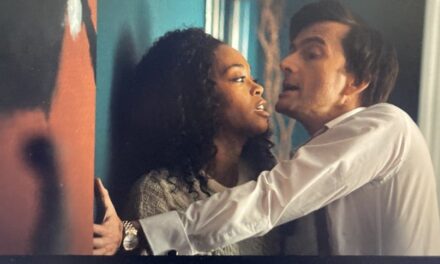“Who’d have thought there were so many different sorts of duck?” asked my wife.
As the restrictions of lockdown eased during 2020, we’d opted to focus our precious hours of outdoor exercise by walking around the local nature reserve, a delightful area with a modest lake large enough for a good selection of wildfowl but too small to accommodate a barquentine. Ideally, we’d have gone for a walk to look at elephants, but we didn’t live close enough to the Equator to get there and back within an hour, so we went for a walk to look at the Anatidae instead.
As that morning, our amble and simultaneous humming of the theme to PAW Patrol (2013-) had led us to an observation point equipped with wallcharts of how to distinguish apparently countless varieties of aquatic avian species.
“I mean,” she continued, “all the different colourings and patternings and crests and sizes of bills and feathers… How on earth can anybody remember all these and tell all these animals apart?”
“Well,” I pondered, “I guess it’s expertise. And passion. I mean, for example, you’ve spent decades of your life immersed in television. If somebody showed you a clip from a programme, you may well be able to recognise it. And if not the precise episode or series, then you’d be able to make deductions. Is it British, or American, or Australian, or from the East… or even some transatlantic dual-market show or one of those European co-productions that never quite works? Is it black-and-white or colour? That would maybe fix the time period. Are there breaks for commercials? Is it on videotape or film, or a VT/film mix, or Outside Broadcast or single camera? And if it’s on film, 16mm or 35mm? And the style of the music or the editing? And maybe even the creative talents. If the characters start discussing how 50% of the information held on a person by the American intelligence agencies is wrong, it’s probably written by Alan Plater. If every other frame appears to be reflected off multiple mirrors or shiny surfaces, it’s probably directed by Peter Hammond. And you might be able to hazard a guess at what ITV company if it’s an older commercial British show…”
Ah, yes. That’s one of the aspects of television history that I really love and admire reading about, particularly when people get it right. ITV series and the companies that made them. Because unlike these days when ITV is just one homogenous mass that buys in many of its programmes from independents – like any other channel – and tends to network them simultaneously across the whole of the UK, in the old days – like back in the 1950s and 1960s and 1970s when they’d only just stopped pushing children up chimneys – ITV was this conglomeration of different companies, all with their different styles and approaches and strengths.
To younger or non-UK audiences, the whole subject of ITV is often a very baffling thing – an impenetrable barrier of acronyms like IBA, ABC, ATV (which, confusingly, also began as ABC), TWW, LWT, TTT, TVS, TSW… and that’s even before we get to things like ITN or when ITP becomes ITC.
One of the best quick crash courses in this whole confusing ITV business can be found here on this edition of the Spybrary podcast about espionage literature, movies and television. It’s Dr Joseph Oldham, and he’s meant to be on this extremely good audio offering to promote his equally good book Paranoid Visions: Spies, Conspiracies and the Secret State in British Television Drama (Manchester University Press: 2017) which covers series such as Callan (1967-1972), Special Branch (1969-1974), The Sandbaggers (1978-1980), Tinker Tailor Soldier Spy (1979), Bird of Prey (1982), Edge of Darkness (1985), A Very British Coup (1988) and Spooks (2002-2011). But his Stateside host, Jeff Quest, while highly versed in which agents were created by which authors in which styles, is understandably less certain when trying to disentangle what the difference between BBC and numerous flavours of ITV might be. So, between 5’00” and 9’10”, Jo sorts him out quickly and succinctly and explains how each company therein might offer a different sort of flavour. Tear yourself away from sorting out which TV listings magazines you’re going to leave lying around the house at Christmas, and go give it a listen – it’s brilliant!
So having established that there were over a dozen independent companies all making different programmes – some for purely local use and some intended for diffusion across the ITV network – it soon becomes easy to use these broadcasters as a short-hand for the type of programme you’re talking about. A lot of this, obviously, involved some horrible stereotyping. But, the problem is, that often a stereotype emerges because it tends to be true.
I mean, take a 1960s thriller series from Granada and a 1960s thriller series from ATV. The former is likely to be rather strange, quite off-beat, possibly push the boundaries of formats, maybe delve into challenging subject matter, and most likely be made in monochrome on videotape with location inserts – if any – on film or maybe even OB videotape. The latter is likely to be shot on film, possibly in colour to appeal to the US market, may even have an American lead, be populist and thus avoid topics unacceptable for pre-watershed or offensive to either UK or US markets, and although imaginative often feel more formulaic with recognisable recurring elements. Naturally, such broad brush strokes don’t cover everything in the two company’s catalogues. Patrick McGoohan’s televisual eccentricity The Prisoner (1967-1968) may look and feel like an ATV product – which it is – but in many respects it is closer in content and spirit to series such as The Corridor People (1966) or The Fellows (late of Room 17) (1967) that emanated from Granada.

Fig. 3: A repeat of the figure first blogged on 27 March 2020.
Sitcoms can similarly be categorised in this lazy manner. Thames sitcoms tend to be rather middle-class, middle-of-the-road affairs. LWT sitcoms tend to be either too sophisticated to find an audience or belly-laugh mass appeal at either end of the spectrum (leading to problematic and schizophrenic scheduling). Granada sitcoms tend to feature Northern folk doing Northern things or, at the very least, be richly based in earthy, often working-class character humour. Anglia sitcoms tend to feature either three city women working on a farm as land girls during World War II or be about divorcees living with their mothers… but only because, according to A Knight on the Box: 40 Years of Anglia Television (Anglia: 1999) they only ever made two sitcoms: Backs to the Land (1977-1978) and Marjorie and Men (1985). Spectacular wildlife documentaries like Survival were really more their sort of thing… I bet they knew all the different sorts of duck.
Having heard the Spybrary podcast and bought a copy of Jo’s book, if you’d like to get more of feel for Ye Olde Days Of Regionalisation, check out the LWT sketch show End of Part One (1979-1980). It comes from the ‘sophisticated’ end of the spectrum, which, sadly, meant that LWT didn’t know where to schedule it. As the series itself demonstrates in a sketch during its second series. But writers Andrew Marshall and David Renwick had an amazing understanding of the styles and tropes of the different forms of television – and the disparity between the opulence of the large companies that threw cash around like there was no tomorrow and the ambitious but frugal approach of the lesser franchises formed the bedrock of much of the show’s humour as it magnified the televisual clichés of the time.
One sketch targeted Mr & Mrs (1965-1988, 1999), a cosy quiz in which married couples answered questions about each other to demonstrate their love to the nation and win prizes in programmes made by TWW, HTV and ultimately Border (one of the smaller ITV stations). In the spoof version, Mr & Mr & Mrs, the saccharine host of Boredom Television welcomes the audience at home by saying: “we’ve sold our other camera to bring you a brand new series”.
The other thing about the ITV companies Back In The Day was that they operated often totally different schedules. Yes, you tended to get Coronation Street (1960-) networked on Mondays and Wednesdays (although that hadn’t always been the case) and big Light Entertainment shows on Wednesdays, but most other shows slid around the country’s schedules in a fluid mass. Some regions didn’t take certain series at all. Most famously cited is The Secret Service (1969), the final Supermarionation – or semi-Supermarionation series – from ATV. Although made on 35mm film and intended for ITC’s usual World Wide Distribution, it had a devil of job escaping from the Midlands and finally turned up in the schedules of only Granada and Southern while being roundly ignored by the rest of the country. And I’ll be lazy here and cite it yet again. Who knows, it may be new to somebody out there in academialand?
The upside was – if you lived on the border of two regions – you could time shift. I mean, it’s July 1969, it’s Friday night, I’m in Yorkshire, and I really want to watch LWT’s sitcom On the Buses (1969-1973)[1]. But I don’t fancy having to wait up until 10.30pm and unfortunately I can’t use the Betamax C5 to record it to watch tomorrow because the Betamax C5 won’t be marketed for another nine years. However, I know that if I redirect my aerial towards Anglia at 8pm, I can get my fill of Luxton District antics and still catch the end of The Virginian (1961-1971). I had ITV-2.5 way before I had ITV+1.
So, yes, I love it when I read an article or a book which tells me that such-and-such a programme was made by Westward or Teledu Cymru or Grampian or Carlton or HTV as opposed to the catch-all of ITV because that immediately colours in a lot of the background and context for me, and shows me that the text has been assembled by somebody who gets all this.
And it’s so easy to like it when people delve into the details that distinguish the differences – be it ducks or dramas. We love the notion of a wallchart of wildfowl as much as a tumult of television TLAs.
Long may it continue! Vive la difference!
Andrew Pixley is a retired data developer. For the last 30 years he’s written about almost anything to do with television if people will pay him – and occasionally when they won’t. And he’s very sorry to have wasted valuable minutes of your life with this rubbish at a time when – in your capacity as television academics – you’re probably all very busy deciding which archival editions of the Radio Times or TV Times or TV Guide or other-listing-magazines-are-available to scatter around your home this Christmas.
Footnote
[1] Yes, I know. I was very young. I just saw this as a silly series in which two naughty bus operatives ran rings around their officious boss. I didn’t get the rest of it until well after I’d been to the cinema to help make the Hammer version the UK Box Office hit of 1971. Blame me…









